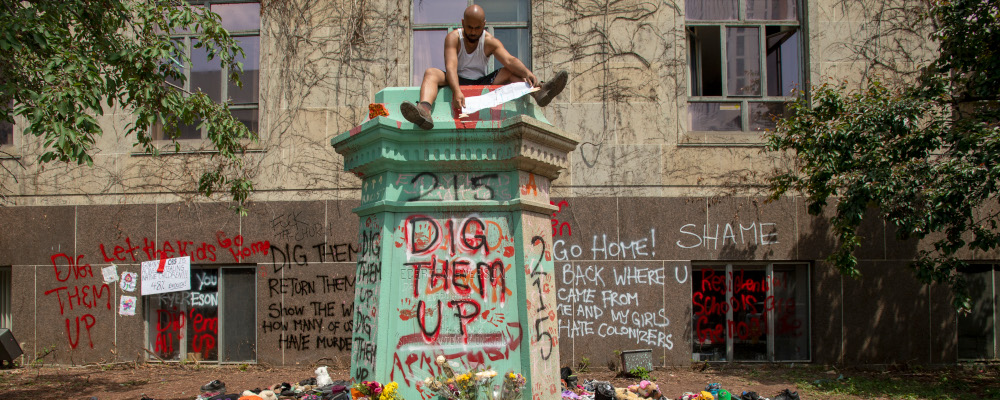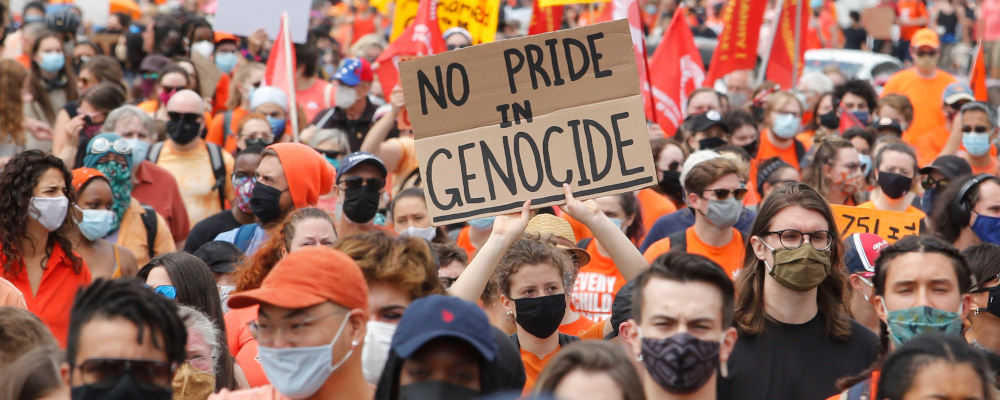I want to follow up Sean Speer’s brilliant “outsider” piece on the state of Canadian history and also take seriously The Hub’s critics whom he writes about. The Hub’s critics are arguing that the historical profession is just fine. No one killed Canadian history. It’s alive and well and broader than ever.
I’m half-convinced.
If Canadian history was truly full of different perspectives, though, let’s imagine how a series of recent controversies might have been different.
Edward Cornwallis
Activists demanded that Edward Cornwallis be defenestrated because of his “scalp bounty” on the Mi’kmaq in the mid-18th century. This is quite the allegation. And yet any scholar with the least amount of knowledge about the history of the Mi’kmaq and its wider Wabanaki confederacy would know that the Mi’kmaq themselves took scalps and other body parts in war. Cornwallis was attacked for doing something his opponents also did. A truly robust historical profession would have offered this contextual information repeatedly—completely changing the public story about the dishonoured Cornwallis.
Henry Dundas
When activists blamed Henry Dundas for delaying the abolition of the slave trade, why didn’t a robust historical profession offer a truly inclusive history of slavery in this country? I have to imagine this is because the real history would complicate woke political stories.
The real history of slavery in this country includes enslaved Africans brought to Canada and also to the Caribbean and the United States. It also, though, includes a lot more. Slavery was common amongst the Indigenous Peoples of the Pacific Northwest. Very common. In what’s now central Canada, Indigenous Peoples sold slaves and took slave captives in war. Recent Canadian immigrants from Africa might have links to slavery, but those links might show they are the descendants of raiders who captured and sold slaves into the Atlantic Slave trade or into the Muslim slave trade. The real history of slavery is complicated. Where was the CHA and its members when Canadians needed a more fulsome account of our actual history of slavery?
Residential school graves
More than two years after the announcement of the “discovery” of graves at Kamloops—and after which the CHA made a number of politically charged public statements—perhaps the main historical body might be interested in getting to the bottom of what actually happened. Are there bodies in the ground? If so, they haven’t been uncovered yet. Why not? If there are graves, how did these individuals die? Are the wild stories about nighttime burials true? Surely historians want to know the answers to these horrible allegations. Instead, some scholars are leading the charge to criminalize anyone who asks questions, calling them “denialists.” It doesn’t get any more Orwellian than that.
The history profession’s four big problems
In each of these cases, and many more, a politically lopsided historical profession has (by and large) simply allowed woke myths and half-truths to run rampant.
We have at least four problems:
First, our universities including our history departments and especially our education faculties are ideological silos. Study after study has shown that at least 90 percent of professors identify as “left-leaning” and vote for left-leaning parties. This isn’t a right-wing talking point; it’s an empirical and easily observable fact.
But, so what? Maybe professors of history and education vote in one way but are open-minded in the classroom. Maybe they hew to a teaching and research method that eschews politics, prioritizes objectivity, and is open to views that challenge left-leaning orthodoxies.
Yet this leads us to problem two: the abandonment (by many, but not all) of objectivity, and the embrace of social justice. Complete objectivity is, of course, impossible. It used to be a goal, a “noble dream.” Yet a number of academics now believe that objectivity is itself a political smokescreen that merely supports an oppressive status quo.
Historians aren’t alone in facing this critique. As Steve Paikin recently said on a recent episode of Hub Dialogues, journalism too is now faced with a younger generation who think it’s their role not to explain all of the sides but instead to pick a side. Historians who emphasize the need to be “allies” of various social communities are doing just this. When the CHA mandates that scholars need to think a certain way about a politically charged topic, or embrace (instead of interrogate) the findings of a government royal commission, they are picking sides.
What might be worse is that it’s also possible some scholars don’t even know they’ve abandoned objectivity. In a politically homogenous environment, politicized categories and concepts just seem normal. Surely “settler colonialism” is a benign concept they might say; it’s not loaded with pre-conceived political assumptions. And the very few conservative scholars who think differently can be dismissed as reactionary cranks.

This leads us to problem three: the impact of social media. Social media threatens scholarship on Canadian history in a few ways. There is obviously the way that algorithms privilege outrage and denunciation. It’s likely not a coincidence that statue toppling and name-changing have trended along with other kinds of hashtag activism. There’s nothing new about toppling a statue, but the phenomenon has wildly exploded in popularity. What’s worse, a number of the vandals are inspired by so-called professional scholars. Other scholars work behind the scenes, submitting partisan assessments to city councils and school boards, acting as expert voices, even though their political assumptions and blind spots ought to be clear to anyone.
This brings us to problem four: group polarization. Like-minded groups don’t just share a worldview, they become radicalized. For example, juries who all believe a litigant deserves a generous financial settlement enter the jury room with one amount in mind. But when they sit down and find that everyone agrees, the whole group emerges offering a more generous award than any of them would have suggested in the first place. So it is with assessments of Canada’s past. Even if each individual scholar might be more moderate individually, the conformity within the profession means that assessments are collectively radicalized. The dark spots of Canadian history become genocide; those who question parts of the TRC report become “residential school denialists,” ad nauseam.
All of these problems might echo Granatstein’s critique from the 1990s, but they are a new 21st-century conundrum.
Perhaps the biggest risk is what Jonathan Haidt a couple of years ago called “structural stupidity.” This is the term he coined for how social media algorithms deprive institutions of the smartest and most articulate ideas of those who disagree. They reward outrage and the extremes. Moderate voices are silenced and wrongly believe they represent a smaller number than in reality. The whole debate about a topic becomes distorted. Institutions caught in this maelstrom deprive themselves of useful ideas, accurate information, and reliable ways of understanding what it is they are supposed to do.
At a time when it’s sometimes hard to distinguish between Chinese and Russian propaganda and the products of activist academic scholarship, it’s probably time to admit we are fully into the era of historical structural stupidity.
On this note, it’s nice to see the CHA president Don Wright inviting diverse voices into the CHA. It’s a start.




